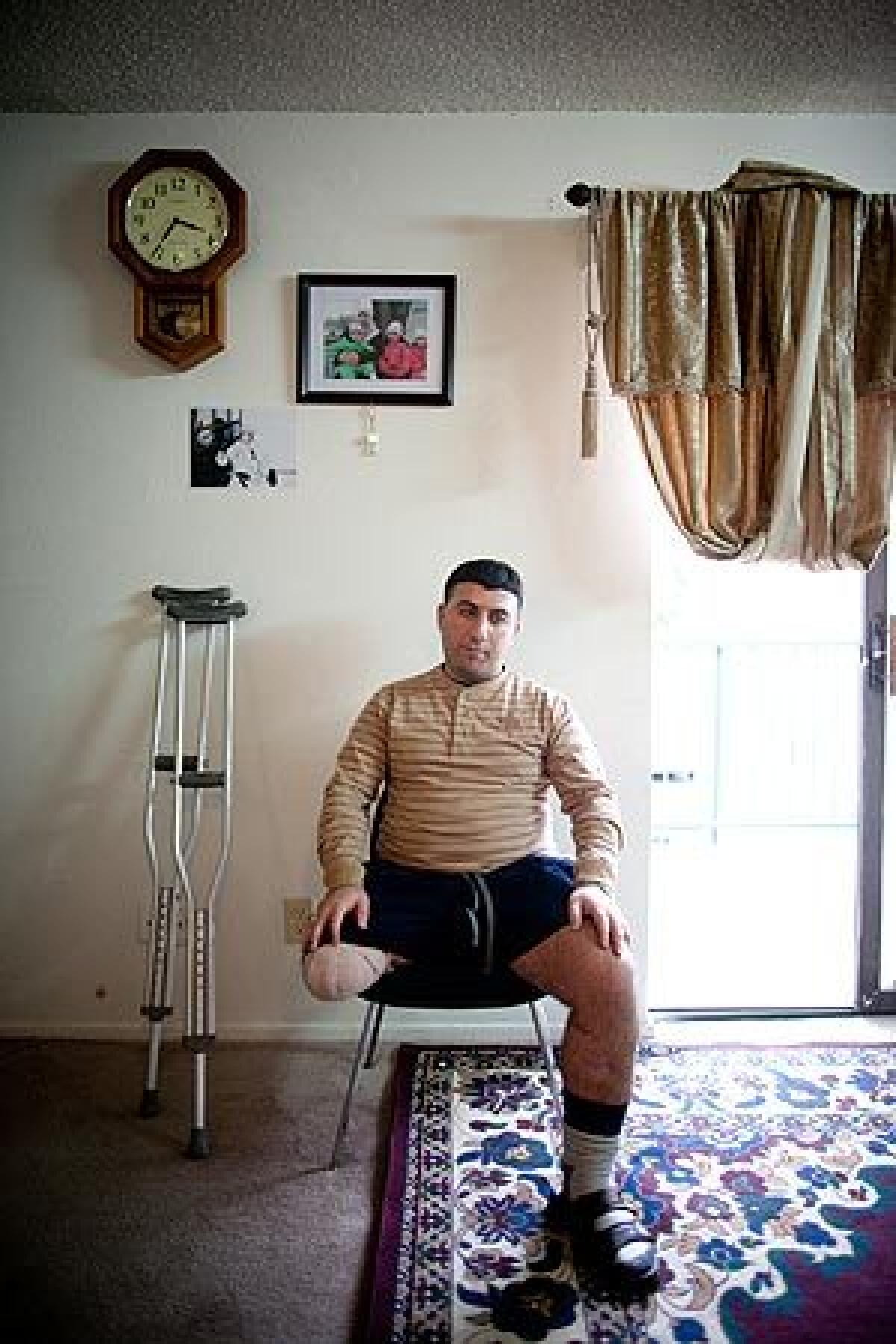Foreign interpreters hurt in battle find U.S. insurance benefits wanting

After the invasion of Iraq, the U.S. military discovered that rebuilding the country and confronting an insurgency required a weapon not in its arsenal: thousands of interpreters.
To fill the gap, the Pentagon turned to Titan Corp., a San Diego defense contractor, which eventually hired more than 8,000 interpreters, most of them Iraqis.
For $12,000 a year, these civilians served as the voice of America’s military, braving sniper fire and roadside bombs. Insurgents targeted them for torture and assassination. Many received military honors for their heroism.
At least 360 interpreters employed by Titan or its successor company were killed between March 2003 and March 2008, and more than 1,200 were injured. The death toll was far greater than that suffered by the armed forces of any country in the American-led coalition other than the United States. Scores of interpreters assisting U.S. forces in Afghanistan also have been killed or wounded.
An insurance program funded by American taxpayers was supposed to provide a safety net for interpreters and their families in the event of injury or death. Yet for many, the benefits have fallen painfully short of what was promised, an investigation by the Los Angeles Times and ProPublica found.
Interviews, corporate documents and data on insurance claims show that:
* Insurers have delayed or denied claims for disability payments and death benefits, citing a lack of police reports or other documentary evidence that interpreters’ injuries or deaths were related to their work for the military. Critics, including some U.S. Army officers, say it is absurd to expect Iraqis and Afghans to be able to document the cause of injuries suffered in a war zone.
* Iraqi interpreters taken to neighboring Jordan for medical treatment say they were pressured to accept lump-sum settlements from insurers, rather than a stream of lifetime benefits potentially worth more, and were told that if they didn’t sign, they would be sent back home -- a potential death sentence for Iraqis associated with the American war effort.
* Interpreters who have immigrated to the United States as refugees have ended up penniless, on food stamps or in menial jobs because their benefits under the U.S. insurance program are based on wages and living costs in their home countries. Payments intended to provide a decent standard of living in Iraq or Afghanistan leave the recipients below the poverty level in this country.
Iraqi Malek Hadi was working with U.S. military police outside Baghdad when a homemade explosive detonated beneath his Humvee in September 2006. The blast tore off his right leg, mangled the left and sheared off several fingers.
Today, Hadi, 25, lives alone in a crime-ridden neighborhood in Arlington, Texas. He struggles to climb the stairs to his second-floor apartment on crutches. He has been diagnosed with post-traumatic stress disorder but is not receiving treatment because his insurer has refused to pay for it.
He lives on $612 a month in disability payments, the maximum available under the war-zone insurance system.
“When we were in Iraq, we were exactly like the soldiers,” Hadi said. “Why are we treated differently now?”
Retired U.S. Army Col. Joel Armstrong, who served in Iraq and was a leading proponent of the 2007 troop buildup, or “surge,” that helped reduce violence in the country, said Iraqi interpreters were crucial to the strategy’s success.
“Without them, you really can’t operate effectively as a force. It’s just impossible,” Armstrong said. It is deplorable, he added, that interpreters injured while assisting American troops have had to fight for benefits.
“Every American should feel terrible about it,” he said. “It’s a shame.”
American International Group Inc., or AIG, the principal provider of insurance coverage for interpreters in Iraq, declined to answer detailed questions on its policies or comment on specific cases.
Marie Ali, a spokeswoman for the AIG unit that sold the coverage, said the company “is committed to handling every claim professionally, ethically and fairly. In all cases, it is our policy to respect the privacy of our customers and claimants and not discuss the specifics of individual claims.”
Claims and disputes
Under a World War II-era law known as the Defense Base Act, companies working under contract for the U.S. military overseas must provide workers’ compensation insurance for their employees, both Americans and foreign nationals. The cost of the coverage is built into Pentagon contracts and so is ultimately paid by taxpayers.
The insurance system, administered by the U.S. Department of Labor, once handled a few hundred claims a year. It expanded dramatically after the invasions of Afghanistan and Iraq because of the Pentagon’s heavy reliance on civilian contract workers to drive fuel trucks, cook meals and provide other support services.
Today, there are more civilian workers than uniformed troops in the two battle zones, and more than 1,700 contract workers have died.
Interpreters in Iraq were covered by insurance purchased by their employer, first Titan Corp. and later L-3 Communications, a New York defense contractor that acquired Titan in 2005. L-3 paid AIG more than $20 million a year in premiums, according to corporate records.
Once a worker files an injury claim, the employer’s insurer must begin paying benefits within two weeks or file a “notice of dispute.”
Interpreters who suffered the worst injuries, such as loss of a limb or severe brain damage, typically received compensation relatively quickly. That is because they were treated at U.S. military facilities in Iraq, where staff members documented their injuries.
In other cases, AIG often had difficulty establishing to its satisfaction that interpreters’ injuries or deaths were work-related. The company routinely filed notices of dispute while it investigated the claims.
“Even determining the facts of an accident -- the location and the circumstances -- can be a challenge,” Charles Schader, AIG’s president of worldwide claims, told a congressional panel in June. “Without sufficient information, examiners cannot make timely final determinations within 14 days.”
To pay death benefits, AIG required police reports or other supporting documents, according to former L-3 officials. Internal L-3 records from 2005 show that AIG examiners sent to Iraq were able to find documentation deemed necessary for benefits in only half the cases examined.
“If you’re missing one piece of documentation, you got denied,” said Colleen Driscoll, who oversaw the handling of interpreters’ insurance claims for L-3. “These guys get murdered coming and going to work, and AIG turns them down because they don’t have a letter from the insurgents.”
Driscoll, a former United Nations refugee official, left L-3 in 2007. She said the cause was a dispute with company executives over treatment of injured interpreters.
She and another former L-3 official, Jennifer Armstrong, said their experience suggested that 10% to 20% of the company’s Iraqi workers who should have received benefits were denied.
Armstrong said that in one instance, a slain interpreter’s widow and children had to live for months in the company’s compound in the heavily fortified Green Zone in Baghdad while they waited for death benefits to be approved. It was too dangerous for the family to remain in their home, and they could not afford to relocate, she said.
“The Iraqis were looked at as second-class citizens,” said Armstrong, who now works for another defense contractor. “It just became a business. When it became a business, you lost sight of the goal.”
L-3 did not respond to requests for comment.
In Jordan
AIG arranged for many of the most severely wounded Iraqis to be transferred to Jordan, where medical facilities were better and interpreters did not face the risk of assassination.
Emad Hatabah, a Syrian-trained physician who had been medical director of AIG’s Jordanian subsidiary, exercised broad authority over their care. A medical evacuation company that Hatabah owned transported interpreters from the war zone. He selected their doctors and arranged stays at hotels and rehabilitation clinics.
Once their treatment was concluded, Hatabah presented interpreters with settlement agreements providing for lump-sum payments, in return for which AIG would be released from further liability.
Several Iraqis said Hatabah pressed them to sign and told them that if they refused, they would be sent back to Iraq.
In spring 2007, more than a dozen interpreters sent L-3 officials a petition complaining of “bad treatment” by Hatabah and asserting that he had threatened to have them deported.
One of the interpreters, Ali Kanaan, suffered hearing loss and burns to more than a third of his body as a result of a 2006 suicide bombing.
Hatabah offered him a $62,000 settlement on AIG’s behalf, records show. Kanaan said that when he resisted, Hatabah told him that if he didn’t accept the lump sum, he would have to return to Iraq to pursue a claim for disability benefits.
Kanaan decided to take the offer.
“If you obey Dr. Emad’s rules, you’ll be fine,” he said. “If you don’t, you got kicked out.”
Kanaan later immigrated to the U.S. as a refugee. Now 23, he works 12 hours a day in a cigarette store in a Denver suburb. At night, he cleans the stove hoods in restaurant kitchens. The caustic chemicals irritate his skin grafts, he said.
Hatabah, interviewed in Amman, the Jordanian capital, said the interpreters received exemplary care. He denied pressuring any of them to sign settlements or threatening to send them back to Iraq.
Hatabah said AIG’s office in Dubai, United Arab Emirates, sent him settlement agreements and his only role was to witness the signing. He said that because he is employed by AIG, he took care never to act as the treating physician for any interpreters, in order to eliminate even the appearance of a conflict of interest.
“I believe we did more than a good job,” Hatabah said. “It was a perfect job.”
Few know rights
Interpreters and other injured workers can appeal insurers’ denials through a dispute resolution system in the Department of Labor. Ultimately, an administrative law judge decides the matter. The department must approve all settlements, and officials are supposed to review offers with the affected workers to make sure compensation is adequate.
“The whole purpose is to recognize that a guy who’s never had a $100,000 check in his life before is a sucker for a bad deal,” said Joshua Gillelan, a former lawyer for the department who now represents civilian workers injured in Iraq and Afghanistan.
But few Iraqis know they have rights in the system, and interpreters interviewed for this report said the Labor Department never contacted them about settlement offers.
“Nobody called me or told me or did anything for me,” said Nazar Taei, 40, whose legs were riddled with shrapnel during a mortar attack in 2006.
After he arrived in the U.S. as a refugee, AIG offered Taei an $18,500 settlement, he said. He was dissatisfied with the amount, but accepted it.
“I told AIG, ‘Is this enough for somebody to start his life, who lost his job, a part of his life?’ ” recalled Taei, a Denver resident who recently enlisted in the U.S. Army and hopes to become an interpreter. “They said, ‘Those are the rules. We can’t do anything for you.’ ”
In at least one case, an AIG representative discouraged Iraqis from contacting the Labor Department. In an e-mail exchange last year, the father of an L-3 interpreter killed in a car bombing wrote to AIG, seeking to speed payment of death benefits.
The father, who revealed details of the case on condition of anonymity, asked an AIG examiner in Dubai about contacting Labor officials.
“I wouldn’t advice [sic] you to do so,” the examiner replied by e-mail. “You would be taking the full responsibility of the outcomes.”
Labor Secretary Hilda Solis declined requests for an interview. In a statement, the Labor Department said the increase in the use of civilian contract workers in Iraq and Afghanistan has posed formidable challenges for the war-zone insurance system. The department has no employees posted in Iraq, Afghanistan or surrounding countries, nor any speakers of Arabic or Afghan dialects.
The statement said Labor depends on insurers and defense contractors to inform workers of their rights and to report injuries.
“There is no way to comprehensively monitor compliance as the many levels of subcontracting to workers from around the globe makes such oversight impossible,” the statement said. “We understand and are concerned about the fact that we are unable to place staff at the front lines to ensure that all workers understand their rights.”
A three-year fight
After the explosion blew off his leg in 2006, Malek Hadi was sent to Jordan for treatment. There, AIG offered him a $60,000 lump-sum settlement, he said.
Hadi rejected the offer and said he was deported to Iraq within a month.
He later returned to Jordan as a refugee. He had applied for disability benefits but was not receiving any, and he could not get an explanation from AIG, he said. He lived on handouts from family and friends while waiting for permission to immigrate to the U.S.
Internal AIG documents indicate that a claims examiner withheld Hadi’s benefits in an effort to force him to accept the lump sum. Hadi was “clearly entitled” to benefits, a different AIG examiner wrote in a memo dated August 2008. The company had not paid because the previous examiner “was trying to get the claimant to decide whether to settle his claim,” the memo said.
After arriving in the U.S., Hadi again contacted AIG, this time seeking medical treatment as well as disability payments. A psychologist working with a refugee agency in Texas had diagnosed him with post-traumatic stress disorder. In addition, Hadi’s prosthetic right leg was causing sharp pains and his damaged left leg ached constantly.
AIG formally contested the claim, saying that he needed further medical evaluation. This summer, more than three years after Hadi lost his leg, AIG began paying him disability benefits of $612 a month. It still has not approved his request for medical treatment.
Hadi spends most of his days in his Arlington apartment, watching Arabic television and texting friends back home. “I lost my leg. My life is broken,” he said. “For what?”
A favorite possession is a gold coin given to him by a member of the 89th Military Police Brigade after he was injured.
“Proven in Battle,” it says.
More to Read
Start your day right
Sign up for Essential California for news, features and recommendations from the L.A. Times and beyond in your inbox six days a week.
You may occasionally receive promotional content from the Los Angeles Times.






